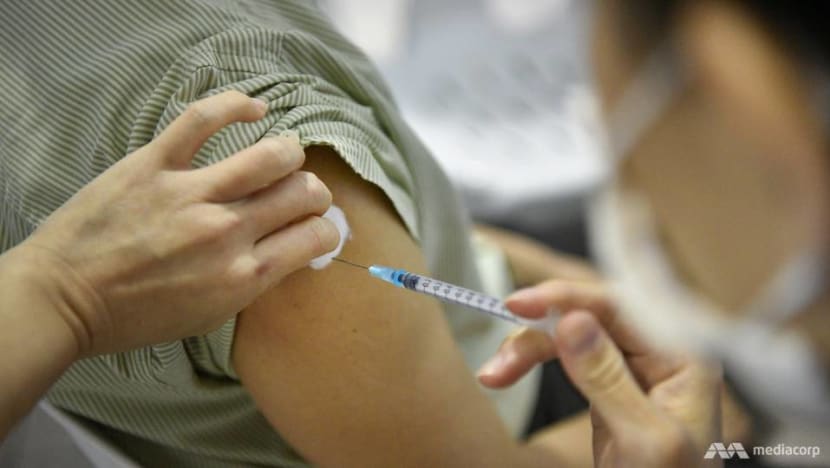Full COVID-19 vaccination provides 69% protection against infection by Delta variant: Singapore study

A person receiving a dose of the COVID-19 vaccine at Tanjong Pagar Community Centre on Jan 27, 2021. (Photo: CNA/Jeremy Long)
SINGAPORE: A Singapore study has found that COVID-19 vaccination provides about 69 per cent protection against infection by the Delta variant of the coronavirus, regardless of symptoms, Health Minister Ong Ye Kung said on Wednesday (Jul 7).
Citing the study by the National Centre for Infectious Diseases (NCID) and Ministry of Health (MOH), he said the data also showed that the vaccine's protection against symptomatic disease is “between 80 and 90 per cent”.
“Effectiveness of vaccination against severe COVID-19 disease, requiring oxygen supplementation, ICU (intensive care unit) care or death, is at 93 per cent,” he added.
NCID and MOH recently concluded a study of about 1,000 household contacts of COVID-19 cases between September 2020 and end-May this year.
These findings will be “submitted for international publication”, and is Singapore’s contribution to the understanding of the Delta variant and vaccines, said the Health Minister.
READ: Groups of five can dine out from Jul 12; work-from-home remains the default
READ: People fully vaccinated under national exercise may be able to gather in groups of 8 from end-July
Among the local cases reported since Apr 11 this year, about 1 per cent of those vaccinated required oxygen, and none were admitted to ICU.
"Compared to the unvaccinated cases who developed severe illnesses, the percentage is 10 per cent," said Mr Ong.
MOH's director of medical services Kenneth Mak said their experience with infections, particularly with the Delta variant, has been that those who are vaccinated are either mildly symptomatic or asymptomatic.
“Therefore it's reasonable to expect that within the vaccinated group, the chances of having an excellent outcome is very high," he said.
But as this may be a “mixed group of people”, including those who already are frail or with other medical conditions, it “would be complacent to say there will never be any bad outcomes”, he added.
Those currently in ICU are unvaccinated cases, he added.
“We continue to expect that as long as we will have some proportion of our population who are not vaccinated, we would still safeguard our hospital resources and expect that for some of these individuals, we will still have to extend the best of care, because they are ill and they may have a severe outcome," said Assoc Prof Mak.
REBOOK SECOND APPOINTMENT
About two-thirds of Singapore’s population has now received the first dose of a vaccine. At least half of the population is expected to complete the full vaccination regimen by end-July.
“In the coming days, or one or two weeks, we will pretty much saturate our coverage of first doses, which means our objective of … giving as many of our people as possible good protection, that objective would have been achieved,” Mr Ong said.
“So, we will now have to urge individuals to rebook your second dose appointments earlier - because your second dose appointment might be in August - rebook them earlier, so that the interval between first and second doses is four weeks, instead of six to eight weeks.
“We are not constrained by supplies anymore, in fact, we have the capacity to deliver more dosages.”
READ: Sale of DIY COVID-19 test kits to be extended to supermarkets and convenience stores; no more purchase limits
He also cited a UK study, which showed that against the Delta variant, vaccine protection from symptomatic disease is 35 per cent with one dose. It increased to 79 per cent with two doses, Mr Ong said.
About 131,000 people have moved forward their appointments, with another 200,000 yet to do so, the minister said.
UPDATE ON VACCINATION BY AGE GROUPS
Mr Ong also provided an update on the progress of Singapore’s vaccination. To date, 39 per cent of Singapore’s population is fully vaccinated against COVID-19, he said.
Under the national vaccination programme, which uses the Pfizer-BioNTech/Comirnaty and Moderna vaccines, about 5.9 million doses have been administered. About 2.1 million people - about 39 per cent of Singapore's population - have received two doses.
On average, Singapore is vaccinating about 76,000 people a day.
"Our total capacity is 80,000 or so, so actually we have capacity to vaccinate more, so we do need more people to come forward to get vaccinated," Mr Ong said.
He also provided a breakdown by age groups of people who have received a first dose or booked an appointment for a first dose.
They are:
70 years old and above: 71 per cent
60 to 69 years old: 85 per cent
50 to 59 years old: 86 per cent
40 to 49 years old: 86 per cent
30 to 39 years old: 78 per cent
20 to 29 years old: 80 per cent
12 to 19 years old: 80 per cent
"I think we can realistically expect our population eventually to reach this level of vaccination, about 80 per cent or so, if all these numbers come through," said Mr Ong.
He urged more seniors to get vaccinated, noting that the group of seniors above 70 years old has the lowest first dose and booking rates.
In countries with high vaccination rates, infections have gone up mainly among young people because they are "up and about and less vaccinated", but hospitalisations and severe illness are mostly among old people.
Even if unvaccinated elderly people choose not to go out, they can still become infected when their family members go out and "bring the virus back home".
"We will be making a bigger push to reach out to our seniors, knocking on their doors if necessary," said the Health Minister.
Getting half of the population fully vaccinated will be an "important milestone", and may enable people to dine-in in bigger groups or take part in bigger events.
“Once we reach 50 per cent, it will be timely for us to have a more definitive roadmap to transit towards endemic COVID-19,” he said.
"The transition ... our style will never be a big bang. Our approach is always to do in steps, do in phases, in a safe, in a cautious way."
Watch the full conference and the following Q&A session with journalists:
BOOKMARK THIS: Our comprehensive coverage of the COVID-19 pandemic and its developments
Download our app or subscribe to our Telegram channel for the latest updates on the coronavirus outbreak: https://cna.asia/telegram












